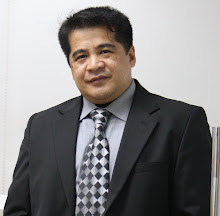Useful excerpts from the blog site of Isagani R. Cruz (Former Philippine Undersecretary of Education).
Here are some interesting questions asked by the teachers, with my comments.
Q: Sir, comment on this: The best English teachers should be placed in the primary years rather than in the intermediate years, so as to establish a strong sense of language. A: Absolutely, and not only because of language but because of teaching skills. The better the teacher, the younger the students should be. Similarly, in universities, the top professors should teach first-year students or repeaters. The moment I became the highest-ranked professor at De La Salle University, I volunteered to teach the basketball players.Q: What is more important, fluency or comprehension?
Here are some interesting questions asked by the teachers, with my comments.
Q: Sir, comment on this: The best English teachers should be placed in the primary years rather than in the intermediate years, so as to establish a strong sense of language. A: Absolutely, and not only because of language but because of teaching skills. The better the teacher, the younger the students should be. Similarly, in universities, the top professors should teach first-year students or repeaters. The moment I became the highest-ranked professor at De La Salle University, I volunteered to teach the basketball players.Q: What is more important, fluency or comprehension?
A: I would rather have someone who understands what is going on, rather than one who talks without understanding.
Q: In reading a literary piece, which usually takes place first – understanding before appreciation or appreciation before understanding?
Q: In reading a literary piece, which usually takes place first – understanding before appreciation or appreciation before understanding?
A: Unlike other arts, literature needs to be understood before it can be appreciated. For other arts, such as music or painting, you may be able to appreciate or enjoy a piece without necessarily understanding it.
Q: What if a student can read but he cannot comprehend? Can I consider him as a non-reader?
Q: What if a student can read but he cannot comprehend? Can I consider him as a non-reader?
A: I can read a hundred languages, as long as they are in the Roman alphabet, but I cannot understand them. I mean that I can pronounce the words, because I can read the letters, but I obviously cannot understand whatever it is that I am pronouncing. Here is an example, which anyone can read – chabdemfloking – but no one can comprehend (because I just made up the word out of the letters of the alphabet from A to O, except for J). Reading without comprehension is like wearing a suit or a gown and going to bed: what’s the point of dressing up?
Q: Is it okay for a teacher to talk in Korlish [code-switching between Korean and English] in order to be understood by students?
Q: Is it okay for a teacher to talk in Korlish [code-switching between Korean and English] in order to be understood by students?
A: No. Students can always understand straight Korean (or Chinese or Japanese or Tagalog or whatever) or straight English even if they can speak only in Korlish. There is no excuse whatsoever for teachers speaking Korlish in the classroom, because teachers are role models of language use. The key to being understood as an English speaker is to use the proper register (or type) of English. If you use only the most common 1,000 words of English, you can be understood even by grade school students.
NB: Some words were changed for appropriateness. Apologies to the author.
Q: What if we do our very best and still my students absorb nothing?
NB: Some words were changed for appropriateness. Apologies to the author.
Q: What if we do our very best and still my students absorb nothing?
A: You, not the students, have a problem. You think that teaching means giving something to students that they can absorb. You should start thinking of teaching as learning from students. Then you and your students can start communicating. You might want to read up on the wrong method of teaching known as “the banking theory of education.” Bad teachers think that they should deposit something in students’ heads that can later be withdrawn during exams. Good teachers merely point the way to the bank.
January 14, 2007
Dear Teachers,
I hope these will provide new insights into the way we process language and help us with our teaching professions. Dream on!
January 14, 2007
Dear Teachers,
I hope these will provide new insights into the way we process language and help us with our teaching professions. Dream on!
Jie LaoShi



No comments:
Post a Comment